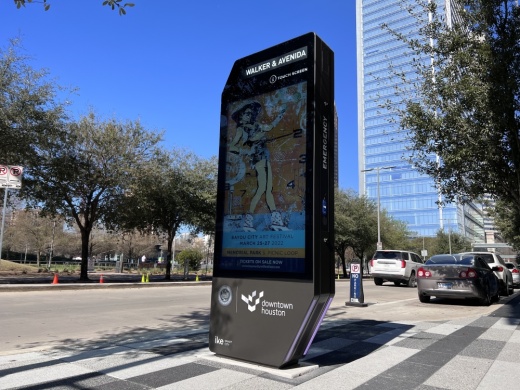Created by a company called IKE Smart City, the kiosks can be used to help residents and tourists search for cultural institutions, local businesses, homeless shelters, addiction recovery programs and food support. They also offer Wi-Fi, public transit data and games. When not in use, the kiosks will display art, community and commercial content.
The first of the kiosks was unveiled Feb. 7 on Avenida de las Americas in downtown Houston. The rest will be placed all over the city in three phases of 25 kiosks each, 10% of which will be located in underserved communities, city officials said.
All 75 kiosks should be installed by 2023. In a 12-year contract with IKE, the city of Houston is expected to receive between $11 million and $50 million in advertising revenue from the kiosks.
Community activist and Heights resident Kevin Strickland told Community Impact Newspaper he is worried about safety, especially for bicyclists and as a potential distraction to drivers.
“I’m a big promoter of biking safety, ... sidewalks and walkability, which is an extremely difficult thing to do in this city,” Strickland said. “When I saw what the city was doing with the placement of the kiosk, to me, it was another example of where the city is not prioritizing people. It’s focused on cars and advertising.”
Central to Strickland’s concerns are three potential locations being studied in the Heights: West 7th Street and Heights Boulevard, West 11th Street and Heights Boulevard, and West 7th Street and Yale Street. The three locations—part of a preliminary determination of where the kiosks could go—are unofficial, and IKE Smart City emphasized it is working with council members, neighborhood groups and property owners as they move forward.
Cooke Kelsey is the chair of Scenic Houston’s advocacy committee, a visual environmental preservation group. In a phone interview, he said he thinks it is hypocritical of the city to implement the kiosks while also pushing for better bike lanes and pedestrian amenities.
“It really is dumbfounding that while the city is trying to develop multimodal safe roadways, it would intervene with a city-operated capsular or digital kiosk program,” Kelsey said. “It’s a recipe for disaster.”
However, the kiosks are specifically placed in areas with reduced speeds and near traffic lights to ensure safety, IKE Development Director Anna Baerman said.
In an email, Baerman said the IKE—which stands for “interactive kiosk experience”—team works closely with the city to ensure resolutions for property owners who voiced concerns. She said the locations have not yet been confirmed because the company is still going through technical due diligence.
Along with safety concerns, Kelsey said he is worried about scenic corridors and parks in Houston.
Heights Boulevard is a scenic corridor, meaning it is one of 19 areas in Houston that is protected from extensive signage under the city’s building code. Within the code, spectacular signs—a sign with flashing, rotating lights or a sign that changes messages automatically more often than once in five minutes—are prohibited in scenic corridors.
Baerman said the kiosks will not have flashing lights. However, she said they will have rotating panels at 10-second intervals when not in use.
Still, Kelsey said he thinks the city would be bending its own rules if it allows the signs to go up in the Heights.
“The Heights is one of the very few in tact historic 19th century neighborhoods,” Kelsey said. “So there’s a scenic character that everyone in Houston appreciates that has been preserved. It’s a huge amenity for everyone.”





